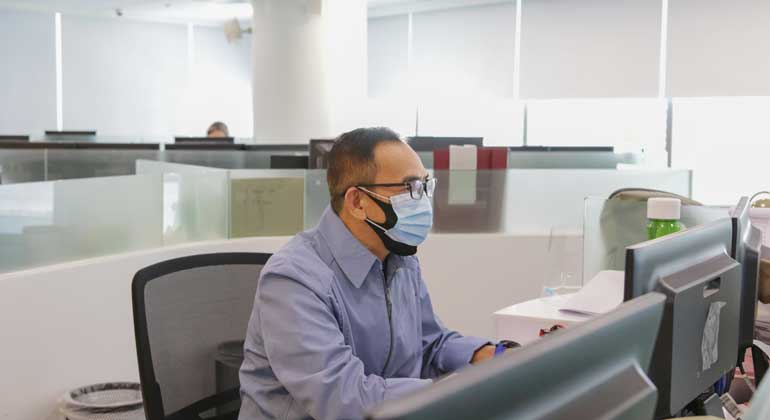
By Denise A. Valdez, Senior Reporter
PHILIPPINE SHARES are expected to return to the 6,000 level in the fourth quarter, but will continue moving within a tight range unless the third-quarter gross domestic product (GDP) results surprise the market.
As 2020 heads to its last three months, investors are seen to remain cautious but optimistic towards the Philippine Stock Exchange index (PSEi), barring unforeseen events.
“Range trading would likely continue unless we see any surprises in third-quarter GDP and corporate earnings,” Alvin Joseph A. Arogo, vice-president and head of equity research division at Philippine National Bank (PNB), said in an e-mail.
The statistics agency will release third-quarter GDP results on Nov. 10.
“We believe that the market will find it challenging to consistently rally above our 6,700 bull case fair value estimate mainly due to the persistent net foreign outflow,” he added.
The local bourse has recorded 153 days of net foreign selling out of the past 183 trading days of 2020. All 20 trading days of the month of April recorded net foreign selling.
“At this level, the index will trade at a 2020 and 2021 price-to-earnings (P/E) of 22.3x and 16.8x, which are at a 31.2% premium and a slight 1.2% discount to the past 15-year average of 17.0x, respectively,” Mr. Arogo said.
PNB is setting a 5,600 base case fair value estimate as a key support level for the PSEi.
Similarly, First Metro Investment Corp. (FMIC) is expecting the index to move “upward and back to above 6,000” in the fourth quarter, said Cristina S. Ulang, FMIC head of research.
“There’s solid upside once the vaccine is implemented, the virus infection curve is flattened and economic indicators return to the path of recovery,” Ms. Ulang said in an e-mail.
Among the factors investors will consider are improvements in manufacturing data and remittances, the softening of interest rates and the signing of legislation addressing bank bad debts.
“Local and foreign funds won’t miss the signs of a recovery and will load up ahead,” Ms. Ulang said.
In the past three quarters, the PSEi has been very volatile due to foreign selling, which is approaching $2 billion and has not abated, Ms. Ulang said.
More specifically, PNB’s Mr. Arogo said the coronavirus pandemic resulted in a 31.9% quarter-on-quarter drop for the PSEi during the first quarter. It recovered by 16.7% in the second quarter due to bargain hunters. Come third quarter, investors generally booked some of these profits, he said.
“At the start of the year, we had a positive view on the market as we assumed then that there would be earnings growth, which was backed by our view at that time of a robust macro environment,” Mr. Arogo said.
“However, although news about (the coronavirus pandemic) appeared earlier, it was only in March that it became clear that the virus would create a ‘black swan’ event (highly unlikely but massive impact on business and society),” he added.
But FMIC’s Ms. Ulang noted the market’s resilience, as the PSEi was still able to hit 6,500 in mid-May.
The PSEi closed at 5,864.23 on Wednesday, up 22.63 points or 0.38% from the previous day. Net foreign selling was sustained for the 14th straight day at P585.58 million.
